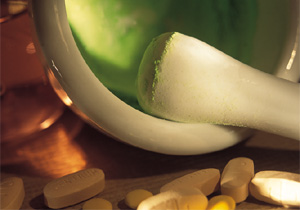Materia Medica - Important
Disclaimer
The information that is available at or
through this site is not intended directly
or by implication to either diagnose or
treat any medical, emotional, or
psychological condition or disorder. It
is always recommended that consultation
with local health care providers be
obtained for specific health or medical
concerns.
Pharmaceutical Name

Semen Ginkgo
Botanical Name

Ginkgo biloba L.
Common Name

Ginkgo seed
Source of Earliest Record

Bencao Gangmu
Part Used & Method for Pharmaceutical Preparations

The ripe seeds are gathered in autumn, cleaned and dried in the sun. After the shells of the seeds have been broken, the seeds are removed and pounded into pieces.
Properties & Taste

Sweet, bitter, astringent, neutral and slightly toxic
Meridian

Lung
Functions

1. To strengthen lung qi and soothe asthma; 2. To relieve leukorrhea
Indications & Combinations

1. Asthma (a) asthma with stifling sensation in the chest and cough with profuse,
dilute sputum. Ginkgo seed (Baiguo) is used with Ephedra (Mahuang) and Licorice
root (Gancao); (b) asthma with stifling sensation in the chest and cough with
thick yellow sputum. Ginkgo seed (Baiguo) is used with Scutellaria root (Huangqin)
and Mulberry bark (Sangbaipi) in the formula Dingchuan Tang.
2. Leukorrhea (a) downward flowing of damp-heat manifested as yellow, odorous
leukorrhea. Ginkgo seed (Baiguo) is used with Phellodendron bark (Huangbai) and
Plantain seed (Cheqianzi) in the formula Yihuang Tang; (b) deficiency of kidney yang
manifested as whitish, odorless leukorrhea. Ginkgo seed (Baiguo) is used with
Cinnamon bark (Rougui), Astragalus root (Huangqi) and Dogwood fruit (Shanzhuyu).
Dosage

6-10 g
Cautions & Contraindications

Overdosage of the herb is toxic.
Back
to Materia Medica
| 
 This website is published, edited and designed by Raymond Cheng,
and reflects only and only his personal views and opinions in his individual capacity.
The information available at this website is not intended
directly or by implication to either diagnose or treat any
medical, emotional, or psychological condition or disorder.
It is also not intended to create a physician-patient relationship
between you and I or between you and Wyith Institute™ and The Office of Dr Raymond K K Cheng.
The information here is not a substitute for advice and treatment provided
by your physician or by another healthcare professional.
It is always recommended that consultation with local healthcare providers
be obtained for any of your specific health or medical concerns.
Furthermore, any products that can be purchased (yet you can see I don't have much
to sell here) through advertisers' banners or through links to other websites
are not either explicitly or implicitly given any warranty or endorsement
by me, my colleagues, Wyith Institute™ or any of its associated businesses.
This website is published, edited and designed by Raymond Cheng,
and reflects only and only his personal views and opinions in his individual capacity.
The information available at this website is not intended
directly or by implication to either diagnose or treat any
medical, emotional, or psychological condition or disorder.
It is also not intended to create a physician-patient relationship
between you and I or between you and Wyith Institute™ and The Office of Dr Raymond K K Cheng.
The information here is not a substitute for advice and treatment provided
by your physician or by another healthcare professional.
It is always recommended that consultation with local healthcare providers
be obtained for any of your specific health or medical concerns.
Furthermore, any products that can be purchased (yet you can see I don't have much
to sell here) through advertisers' banners or through links to other websites
are not either explicitly or implicitly given any warranty or endorsement
by me, my colleagues, Wyith Institute™ or any of its associated businesses.



 Thank you for visiting this TCM and acupuncture information website.
If you have previously been to this website, you might have
noticed that some of the pages on ancient historical ideas and
holistic thinkings related to Chinese metaphysics are temporarily taken offline.
This is because I will be revamping the whole website and be moving
those information into a new \"Ancient Chinese Culture\" section
so as to reflect a more current perspective on the interpretation
of some of the fundamental concepts as well as to include
some of the latest information in the area.
But if you have just found this website for the very first time, I welcome you again and
wish you could find what you require and, hopefully, you could also be benefitted
from reading the articles I published on this website.
Thank you for visiting this TCM and acupuncture information website.
If you have previously been to this website, you might have
noticed that some of the pages on ancient historical ideas and
holistic thinkings related to Chinese metaphysics are temporarily taken offline.
This is because I will be revamping the whole website and be moving
those information into a new \"Ancient Chinese Culture\" section
so as to reflect a more current perspective on the interpretation
of some of the fundamental concepts as well as to include
some of the latest information in the area.
But if you have just found this website for the very first time, I welcome you again and
wish you could find what you require and, hopefully, you could also be benefitted
from reading the articles I published on this website.